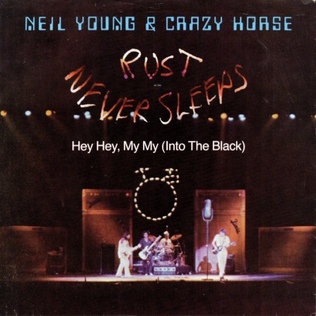Hey Hey, My My
| "Hey Hey, My My (Into The Black)" | |
|---|---|
 |
|
| Single by Neil Young and Crazy Horse | |
| from the album Rust Never Sleeps | |
| B-side | "My My, Hey Hey (Out of the Blue)" |
| Released | August 27, 1979 |
| Format | 45 RPM Record |
| Recorded | October 22, 1978, The Cow Palace, Daly City, California |
| Genre | Hard rock |
| Length | 5:18 |
| Label | Reprise |
| Songwriter(s) | Neil Young, Jeff Blackburn |
| Producer(s) | Neil Young, David Briggs, Tim Mulligan |
"Hey Hey, My My (Into the Black)" is a song written by Neil Young. Combined with its acoustic counterpart "My My, Hey Hey (Out of the Blue)", it bookends Young's successful 1979 album Rust Never Sleeps. Inspired by electropunk group Devo, the rise of punk and what Young viewed as his own growing irrelevance, the song significantly revitalized Young's career at the time, and today crosses generations, inspiring admirers from punk to grunge. The song is about the alternatives of continuing to produce similar music ("to rust" or – in "My My, Hey Hey (Out of the Blue)" – "to fade away") or to burn out.
A line from the acoustic version of the song, "it's better to burn out than to fade away," became infamous after being quoted in Nirvana frontman Kurt Cobain's suicide note. Young later said that he was so shaken that he dedicated his 1994 album Sleeps with Angels to Cobain.
The song "Hey, Hey, My, My..." and the title phrase of the album, "rust never sleeps" on which it was featured sprang from Young's encounters with Devo and in particular Mark Mothersbaugh. Devo was asked by Young in 1977 to participate in the creating of his film Human Highway. A scene in the film shows Young playing the song in its entirety with Devo, who clearly want little to do with anything "radio-friendly" (of note is Mothersbaugh changing "Johnny Rotten" to "Johnny Spud"). The famous line "It's better to burn out than it is to rust" is often credited to Young's friend Jeff Blackburn of The Ducks.
Some reviewers viewed Young's career as skidding after the release of American Stars 'N Bars and Comes a Time. With the explosion of punk in 1977, some punks felt that Young and his contemporaries were becoming obsolete. Young worried that they were right. The death of Elvis Presley that same year seemed to sound a death knell for rock, as The Clash cried, "No Elvis, Beatles or The Rolling Stones in 1977!" in the song "1977".
...
Wikipedia
